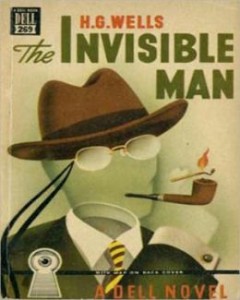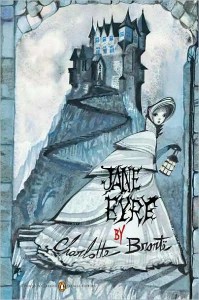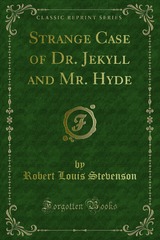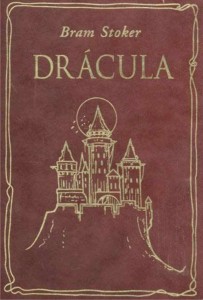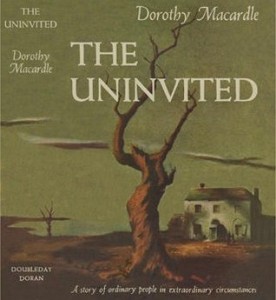Have finally posted all the audio files for the books listed so far on the month long Hallowreads countdown. So you can now listen in on the accompanying text. This was lots of fun.
Tag Archives: Literature
When you can’t see the Bogey Man, how do you know he’s not there?
They drew aside as he passed down the village, and when he had gone by, young humorists would up with coat-collars and down with hat-brims, and go pacing nervously after him in imitation of his occult bearing. There was a song popular at that time called the “Bogey Man”; Miss Statchell sang it at the schoolroom concert (in aid of the church lamps), and thereafter whenever one or two of the villagers were gathered together and the stranger appeared, a bar or so of this tune, more or less sharp or flat, was whistled in the midst of them. Also belated little children would call “Bogey Man!” after him, and make off tremulously elated.
Cuss went straight up the village to Bunting the vicar. “Am I mad?” Cuss began abruptly, as he entered the shabby little study. “Do I look like an insane person?” “What’s happened?” said the vicar, putting the ammonite on the loose sheets of his forthcoming sermon. “That chap at the inn—“ “Well?” “Give me something to drink,” said Cuss, and he sat down. When his nerves had been steadied by a glass of cheap sherry—the only drink the good vicar had available—he told him of the interview he had just had. “Went in,” he gasped, “and began to demand a subscription for that Nurse Fund. He’d stuck his hands in his pockets as I came in, and he sat down lumpily in his chair. Sniffed. I told him I’d heard he took an interest in scientific things. He said yes. Sniffed again. Kept on sniffing all the time; evidently recently caught an infernal cold. No wonder, wrapped up like that! I developed the nurse idea, and all the while kept my eyes open. Bottles—chemicals—everywhere. Balance, test-tubes in stands, and a smell of—evening primrose. Would he subscribe? Said he’d consider it. Asked him, point-blank, was he researching. Said he was. A long research? Got quite cross. ‘A damnable long research,’ said he, blowing the cork out, so to speak. ‘Oh,’ said I. And out came the grievance. The man was just on the boil, and my question boiled him over. He had been given a prescription, most valuable prescription—what for he wouldn’t say. Was it medical? ‘Damn you! What are you fishing after?’ I apologised. Dignified sniff and cough. He resumed. He’d read it. Five ingredients. Put it down; turned his head. Draught of air from window lifted the paper. Swish, rustle. He was working in a room with an open fireplace, he said. Saw a flicker, and there was the prescription burning and lifting chimneyward. Rushed towards it just as it whisked up chimney.
So! Just at that point, to illustrate his story, out came his arm.” “Well?” “No hand—just an empty sleeve. Lord! I thought, that’s a deformity! Got a cork arm, I suppose, and has taken it off. Then, I thought, there’s something odd in that. What the devil keeps that sleeve up and open, if there’s nothing in it? There was nothing in it, I tell you. Nothing down it, right down to the joint. I could see right down it to the elbow, and there was a glimmer of light shining through a tear of the cloth. ‘Good God!’ I said. Then he stopped. Stared at me with those black goggles of his, and then at his sleeve.” ‘’Well?” “That’s all. He never said a word; just glared, and put his sleeve back in his pocket quickly. Mr. Bunting thought it over. He looked suspiciously at Cuss. “It’s a most remarkable story,” he said. He looked very wise and grave indeed. “It’s really,” said Mr. Bunting with judicial emphasis, “a most remarkable story.”
H.G. Wells
The Invisible Man, 1897
A window seat, a cup of tea, and thou…
“God will punish her. He might strike her dead in the midst of her tantrums, and then where would she go? Come, Bessie, let us leave her. Say your prayers, Miss Eyre, for if you don’t repent, something bad might come down the chimney and fetch you away.” They left, shutting the door, and locking it behind them.
The red-room was one of the largest and grandest bedrooms in the mansion, yet very seldom slept in. The bed rested on massive pillars of mahogany and was hung with heavy red curtains. The two large windows had blinds that were always drawn down; the carpet was red; the walls were a soft pink. A cushiony easy chair was white, like a pale throne. The room was chilly because it seldom had a fire; it was silent, because it was remote from the rest of the house; it was solemn, because it was so seldom entered. The secret of the red-room, the spell which kept it so lonely in spite of its grandeur, was this – here, in this chamber, my uncle, Mr. Reed, breathed his last breath. Here his coffin was carried by the undertakers’ men. And since that day, nine years ago, a sense of dreary respect had kept visitors away. My seat, to which Bessie and the bitter Miss Abbot had left me riveted, was a low ottoman near the marble fireplace. I was not quite sure whether they had locked the door. When I dared to move, I got up and went to see. Alas, yes. No jail was ever more secure.
Returning to my seat, I passed by the mirror. I glanced at it, and the strange little girl gazing back at me, with a white face and arms and glittering eyes of fear, had the effect of a real ghost. It was like one of the tiny phantoms, half-fairy, half-imp, that Bessie’s evening stories described as coming out of the moors. I returned to my stool.
Charlotte Brontë
Jane Eyre, 1847
Ethos, Logos, Pathos…
It was on a dreary night of November that I beheld the accomplishment of my toils. With an anxiety that almost amounted to agony, I collected the instruments of life around me, that I might infuse a spark of being into the lifeless thing that lay at my feet. It was already one in the morning; the rain pattered dismally against the panes, and my candle was nearly burnt out, when, by the glimmer of the half-extinguished light, I saw the dull yellow eye of the creature open; it breathed hard, and a convulsive motion agitated its limbs.
How can I describe my emotions at this catastrophe, or how delineate the wretch whom with such infinite pains and care I had endeavoured to form? His limbs were in proportion, and I had selected his features as beautiful. Beautiful! — Great God! His yellow skin scarcely covered the work of muscles and arteries beneath; his hair was of a lustrous black, and flowing; his teeth of a pearly whiteness; but these luxuriances only formed a more horrid contrast with his watery eyes, that seemed almost of the same color as the dun white sockets in which they were set, his shriveled complexion and straight black lips.
The different accidents of life are not so changeable as the feeling of human nature. I had worked hard for nearly two years, for the sole purpose of infusing life into an inanimate body. For this I had deprived myself of rest and health. I had desired it with an ardour that far exceeded moderation; but now that I had finished, the beauty of the dream vanished, and breathless horror and disgust filled my heart. Unable to endure the aspect of the being I had created, I rushed out of the room, and continued a long time traversing my bedchamber, unable to compose my mind to sleep. At length lassitude succeeded to the tumult I had before endured; and I threw myself on the bed in my clothes, endeavouring to seek a few moments of forgetfulness.
Mary Shelley
Frankenstein or The Modern Prometheus, 1818
A Fable for Two
…He put the glass to his lips and drank at one gulp. A cry followed; he reeled, staggered, clutched at the table and held on, staring with injected eyes, gasping with open mouth; and as I looked there came, I thought, a change – he seemed to swell – his face became suddenly black and the features seemed to melt and alter – and the next moment, I had sprung to my feet and leaped back against the wall, my arm raised to shield me from that prodigy, my mind submerged in terror.
“O God!” I screamed, and “O God!” again and again; for there before my eyes – pale and shaken, and half fainting, and groping before him with his hands, like a man restored from death – there stood Henry Jekyll!
What he told me in the next hour, I cannot bring my mind to set on paper. I saw what I saw, I heard what I heard, and my soul sickened at it; and yet now when that sight has faded from my eyes, I ask myself if I believe it, and I cannot answer. My life is shaken to its roots; sleep has left me; the deadliest terror sits by me at all hours of the day and night; and I feel that my days are numbered, and that I must die; and yet I shall die incredulous. As for the moral turpitude that man unveiled to me, even with tears of penitence, I cannot, even in memory, dwell on it without a start of horror. I will say but one thing, Utterson, and that (if you can bring your mind to credit it) will be more than enough. The creature who crept into my house that night was, on Jekyll’s own confession, known by the name of Hyde and hunted for in every corner of the land as the murderer of Carew…
Robert Louis Stevenson
The Strange Case of Dr. Jekyll and Mr. Hyde, 1886
Got shivers?
Within, stood a tall old man, clean-shaven save for a long white moustache, and clad in black from head to foot, without a single speck of colour about him anywhere. He held in his hand an antique silver lamp, in which the flame burned without chimney or globe of any kind, throwing long, quivering shadows as it flickered in the draught of the open door.
The old man motioned me in with his right hand with a courtly gesture, saying in excellent English, but with a strange intonation: ‘Welcome to my house! Enter freely and of your own will!’ He made no motion of stepping to meet me, but stood like a statue, as though his gesture of welcome had fixed him into stone. The instant, however, that I had stepped over the threshold, he moved impulsively forward, and holding out his hand grasped mine with a strength which made me wince, an effect which was not lessened by the fact that it seemed as cold as ice – more like the hand of a dead than a living man…
…I went back to the room, and found Van Helsing looking at poor Lucy, and his face was sterner than ever. Some change had come over her body. Death had given back part of her beauty, for her brow and cheeks had recovered some of their flowing lines; even the lips had lost their deadly pallor. It was as if the blood, no longer needed for the working of the heart, had gone to make the harshness of death as little rude as might be.
We thought her dying whilst she slept
And sleeping when she died.
I stood beside Van Helsing, and said: ‘Ah, well, poor girl, there is peace for her at last. It is the end!’
He turned to me, and said with grave solemnity: ‘Not so! alas! not so. It is only the beginning!’
When I asked him what he meant, he only shook his head and answered: ‘We can do nothing as yet. Wait and see.’
Bram Stoker
Dracula, 1897
Fireside beckons…
I forced my way against an impalpable pressure to the foot of the stairs and looked up at her. She stood, taller than I had seen her before, expanding and gathering form, palely luminous. She began to float down towards me, with a slow, sweeping movement I saw the features; the eyes were intensifying their light. I did not want Stella to see those eyes.
I stood on the second step, with my hands behind me gripping the rail. In that way I could hold myself up from falling, despite the trembling of my knees. I shook all over; my skeleton was of ice and my flesh shrank from it; I could not get my voice out of my throat; the words that I spoke were whispered and my laugh hoarse…
The form shrank and dwindled, losing outline and light; it became a greyish column of fog with a luminous nucleus, and it bent. While I pressed upward, it doubled back. My voice was frozen in my throat, but my thoughts went on beating it, like a flail. I saw it cowering, wreathing and writhing like smoke under a downward wind.
Dorothy Macardle
The Uninvited, 1942
Halloween isn’t just for children…but we start there
…Inside the house lived a malevolent phantom. People said he existed, but Jem and I had never seen him. People said he went out at night when the moon was down, and peeped in windows. When people’s azaleas froze in a cold snap, it was because he had breathed on them. Any stealthy small crimes committed in Maycomb were his work. Once the town was terrorized by a series of morbid nocturnal events: people’s chickens and household pets were found mutilated; although the culprit was Crazy Addie, who eventually drowned himself in Barker’s Eddy, people still looked at the Radley place, unwilling to discard their initial suspicions…
…The weather was unusully warm for the last day of October. We didn’t even need jackets. The wind was growing stronger, and Jem said it might be raining before we got home. There was no moon.
The street light on the corner cast sharp shadows on the Radley house. I heard Jem laugh softly. “Bet nobody bothers them tonight,” he said. Jem was carrying my ham costume, rather awkwardly, as it was hard to hold. I thought it gallant of him to do so.
“It is a scary place though, ain’t it?” I said. “Boo doesn’t mean anybody any harm, but I’m right glad you’re along.”
“You know Atticus wouldn’t let you go to the schoolhouse by yourself,” Jem said.
“Don’t see why, it’s just around the corner and across the yard.”
“That yard’s a mighty long place for little girls to cross at night,” Jem teased. “Ain’t you scared of haints?”
We laughed. Haints, Hot Steams, incantations, secret signs, had vanished with our years as mist with sunrise…
Harper Lee
To Kill a Mockingbird, 1960
